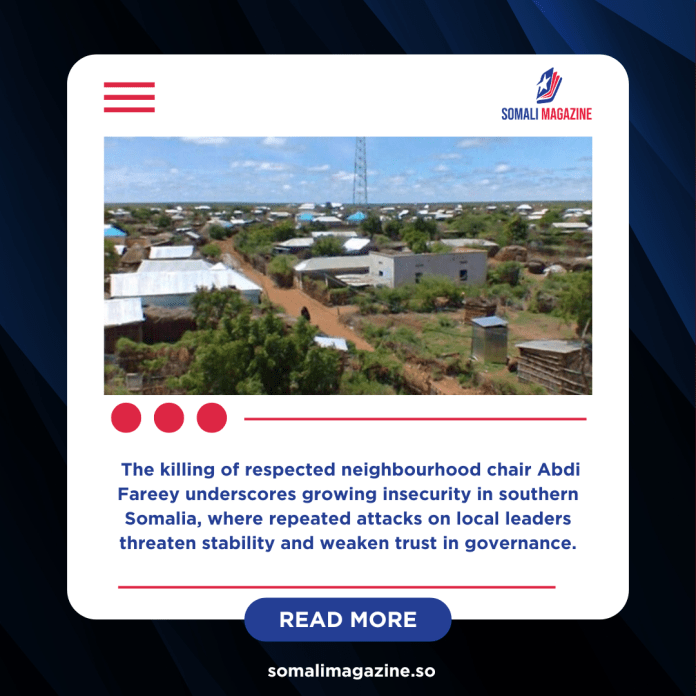Facebook Twitter (X) Instagram Somali Magazine - People's Magazine
A senior neighbourhood official was shot dead late Tuesday night in Garbahaarrey, the administrative capital of Somalia’s Gedo region, in yet another attack that has shaken the already fragile sense of security in the area.
The victim, Abdi Fareey, was well known in Garbahaarrey as the chair of the Towfiiq neighbourhood. Witnesses said he was ambushed by armed men while returning home. The attackers opened fire, killing him instantly before fleeing the scene. Security forces rushed in moments later, sealing off the area and launching an immediate search.
Authorities are still investigating the motive behind the killing. While no group has claimed responsibility, residents described Fareey as a respected community figure who played an active role in mediation and resolving local disputes. His reputation as a peacemaker made him widely admired, and many believe his work may have drawn the attention of those who benefit from instability.
The killing comes at a time when Garbahaarrey and the wider Gedo region are experiencing a worrying rise in targeted assassinations. Local officials, administrators, and even civil servants have increasingly become the focus of attacks, leaving communities fearful and uncertain about their safety. For many, Fareey’s death is not only a personal tragedy but also a symbol of how dangerous public service has become in the region.
On Wednesday morning, police launched sweeping operations across Garbahaarrey in search of the gunmen. Authorities urged residents to share any information that could help track down the perpetrators. They warned that such repeated attacks risk undermining governance and eroding trust between the community and the security institutions meant to protect them.
Residents say the deteriorating situation is the worst they have seen in years. Over the past several months, Gedo has faced a steady rise in politically motivated killings, ambushes, and intimidation campaigns. Local leaders argue that the federal government has not done enough to strengthen security in Garbahaarrey despite its strategic importance.
Gedo lies in southern Somalia and remains a key region in the country’s ongoing fight against al-Shabaab. Its location, close to the Kenyan border, makes it significant for counterinsurgency operations and for controlling vital supply routes. Yet, the surge in violence targeting local officials highlights the difficulty of maintaining stability in an area where armed groups continue to operate in the shadows.
Community members have expressed anger and frustration, saying they feel abandoned by authorities. Many fear that the assassinations are part of a broader effort to intimidate leaders, weaken governance, and discourage people from taking roles in public service. Some also believe the violence is meant to disrupt efforts by local leaders to foster unity and development in the region.
For now, Fareey’s killing has left the Towfiiq neighbourhood in shock. Residents gathered at his home on Wednesday to mourn, remembering him as a fair and approachable leader who always put community interests first. His absence, they say, will leave a painful gap not only in local leadership but also in the delicate process of rebuilding trust among neighbours in a city already struggling with insecurity.
The challenge for Garbahaarrey, and for Somalia as a whole, lies in addressing this cycle of targeted violence. Without stronger security guarantees and meaningful federal support, community leaders will continue to work under the constant threat of assassination. For people in Gedo, that means living in fear that tomorrow another familiar face, another respected leader, may be lost in the same way.
Observers warn that the standoff could further erode public confidence in both the government and opposition, especially if violence escalates. For now, residents of the capital are caught between rival political camps—one calling for public mobilization, the other threatening strict measures against dissent. How the situation unfolds in the coming days may determine whether Mogadishu sees another round of unrest or manages to pull back from the brink.

